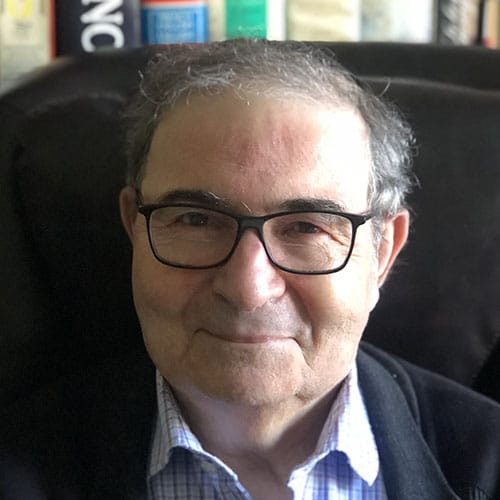 Surasak Suwanmake/Getty Images
Surasak Suwanmake/Getty Images There are four words that have the potential to change the world. They form a well-known saying. They roll off the tongue, are easily understood and even seem obvious. And yet, they have proven to be almost impossible to implement. They are so simple and yet they have eluded us since the beginning of time.
The words are: Live and let live.
Virtually every conflict, in interpersonal relations and on the national and international stages, involves someone or some group attempting to impose their will on others. Merriam-Webster dictionary defines “live and let live” as a saying that “a person should live as he or she chooses and let other people do the same.”
Psychologist Leon Seltzer, writing in Psychology Today, notes that our history and our ego work against cooperation: “After all, it’s only natural that our most primitive ancestors would have been predisposed to confront one another in situations where natural resources vital to survival were in short supply.” Even though our more developed brain and different social conditions have made us more adaptable, we still act in “pre-ethical” ways.
Although recent studies show that we are primed at birth to be empathetic, human ego nurtures a need to see ourselves separate from and better than others, which undermines the ideal of “live and let live.” Add to this, suggests Seltzer, feelings of insecurity originating from when we were children, and you have a potent brew of emotions that make “live and let live” much more complex and difficult that it seems.
The Marginalian’s Maria Popova adds a fascinating point of view. She examines love as the response to the quandary of living in a troubled world and facing the inevitability of death: “To become precious — that is the work of love, the task of love. The recompense of death. The human miracle that makes the transience of life not only bearable but beautiful.”
She points out the heartbreak of “losing sight of just how precious we are to each other, squandering in less-than-love the chance-miracle of our time alive together, only to recover our vision when entropy has taken its toll, when it is too late.” For Popova, the Persian poet Rumi (1207-1273) expresses perfectly the tragedy of the human condition when hostility and conflict crowd out love:
Let’s cherish each other, my friend,
before we lose each other.
Why adore the dead but battle the living?
These comments on the obstacles to “live and let live” make me understand better the Jewish emphasis on love. According to the Sefaria online resource, there are 16,334 references to love in Jewish source texts. In Leviticus, we are commanded to “love your fellow as yourself; I am Hashem.” Why does the verse end with the reminder that it issues from God? Perhaps because our internal, personal obstacles to love need to be overcome through an understanding that consideration for others is a divine imperative.
To emphasize the point, God is described in the Torah as “the Lord, mighty, merciful and gracious, long-suffering and abundant in love and truth.” If God is the embodiment of all those qualities including love, then the message is clear: We are to transcend our grievances and be inspired to emulate the Creator. An exceptional comment in the Talmud draws attention to a profound psychological truth long before the invention of psychology: “Rabbi Akiva said: ‘This is a great principle of the Torah: You shall love your neighbor as yourself, meaning that one should not say, ‘Since I am scorned, I should scorn my fellow as well; since I have been cursed, I will curse my fellow as well.'” Rabbi Akiva understands that what drives most conflict is one’s keenly felt need for revenge for a perceived offence and he strongly discourages this all-too-human weakness. This is an attempt to promote harmony rather than discord, again pointing out that its source is divine.
If God is the embodiment of all those qualities including love, then the message is clear: We are to transcend our grievances and be inspired to emulate the Creator.
Jewish sources begin with the self, move to love of parents, and on to people who are different from us. Leviticus states that “the stranger who resides with you shall be to you as your citizens; you shall love each one as yourself, for you were strangers in the land of Egypt; I am Hashem your God.” This breadth starts with the individual and his or her own personal issues and progresses to love of others and even strangers. In fact, the prophet Micah universalizes the concept to include all: “What does God require of you? Only that you do justice and love goodness.” This statement is general and inclusive. It is astonishing and revolutionary in a society that was tribal and where fear of the other and constant wars were the norm.
Whether viewed psychologically, poetically or theologically, the problem of implementing the principle of “live and let live” is a matter of overcoming the desires of the self for the good of all, transcending ego for the benefit of everyone, making a conscious decision to seek peace and refuse conflict. The war in Ukraine has sparked a resolve in the free world to confront tyranny. That is a hopeful sign.
Whether viewed psychologically, poetically or theologically, the problem of implementing the principle of “live and let live” is a matter of overcoming the desires of the self for the good of all, transcending ego for the benefit of everyone, making a conscious decision to seek peace and refuse conflict.
If we learned from psychology that primal urges play a role in human behavior, if we were inspired by the aspirations and beauty of poetry and prose, and if we renewed our relationship with the concepts of dignity and love found in our religious traditions, perhaps we would progress toward a more humane world. The psychologists, the poets and religious teachings demonstrate that only love can drive out hatred, only light can defeat darkness and only hope can cure despair. This is not idealism. It is a genuine and urgent need to put an end finally to a world sick of suffering and despair.
As Martin Luther King said: “Those who love peace must learn to organize as effectively as those who love war.” And it all starts with each one of us.
Dr. Paul Socken is Distinguished Professor Emeritus and founder of the Jewish Studies program at the University of Waterloo.





















 More news and opinions than at a Shabbat dinner, right in your inbox.
More news and opinions than at a Shabbat dinner, right in your inbox.